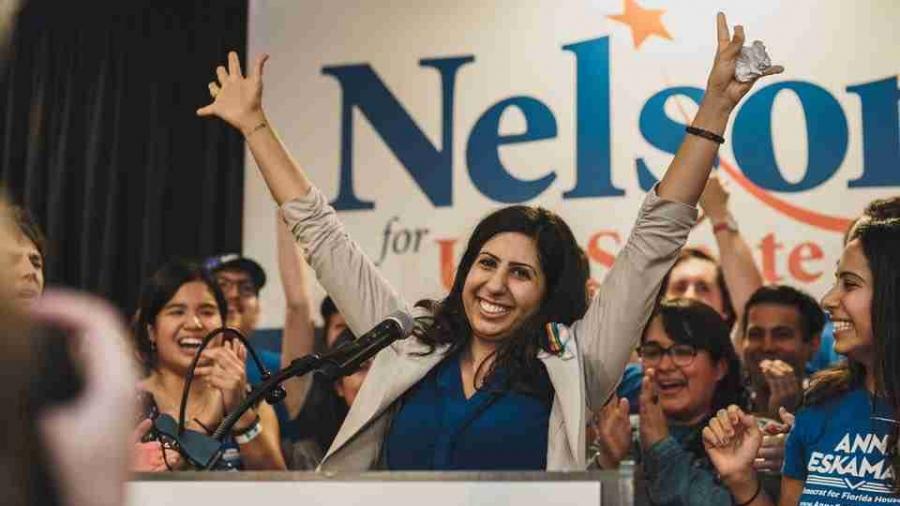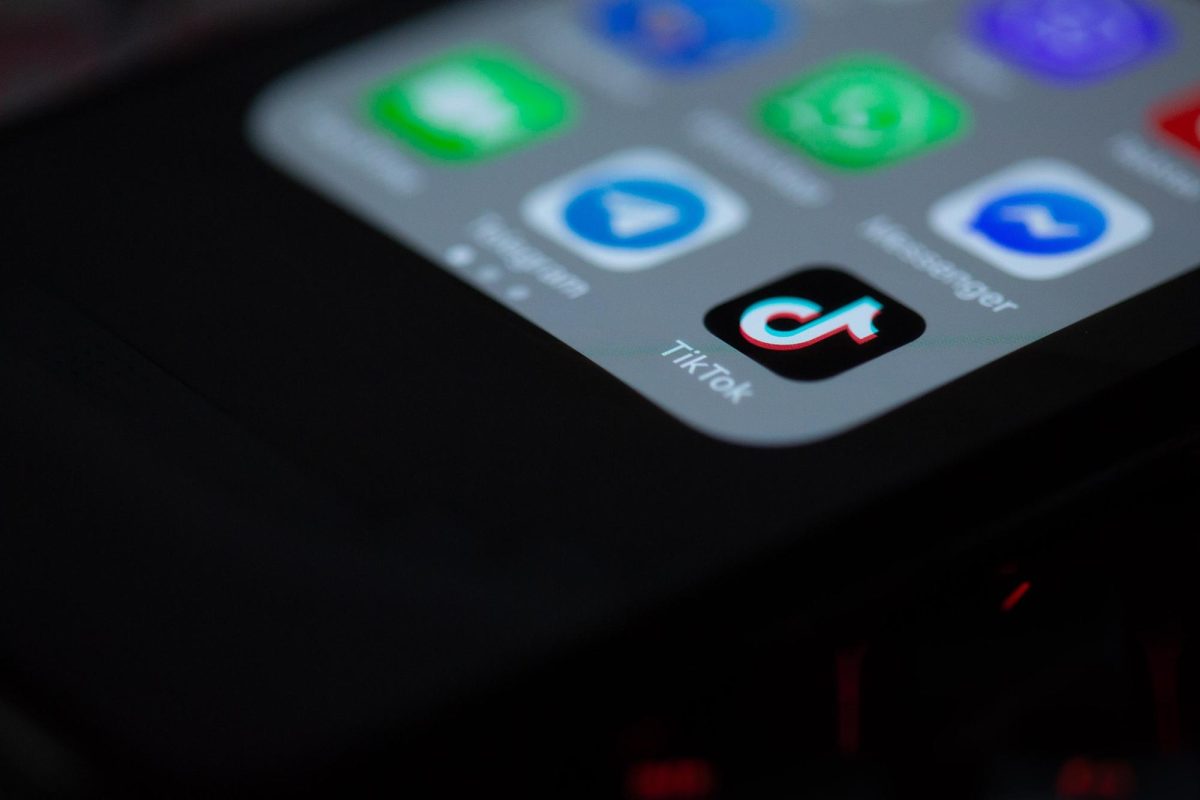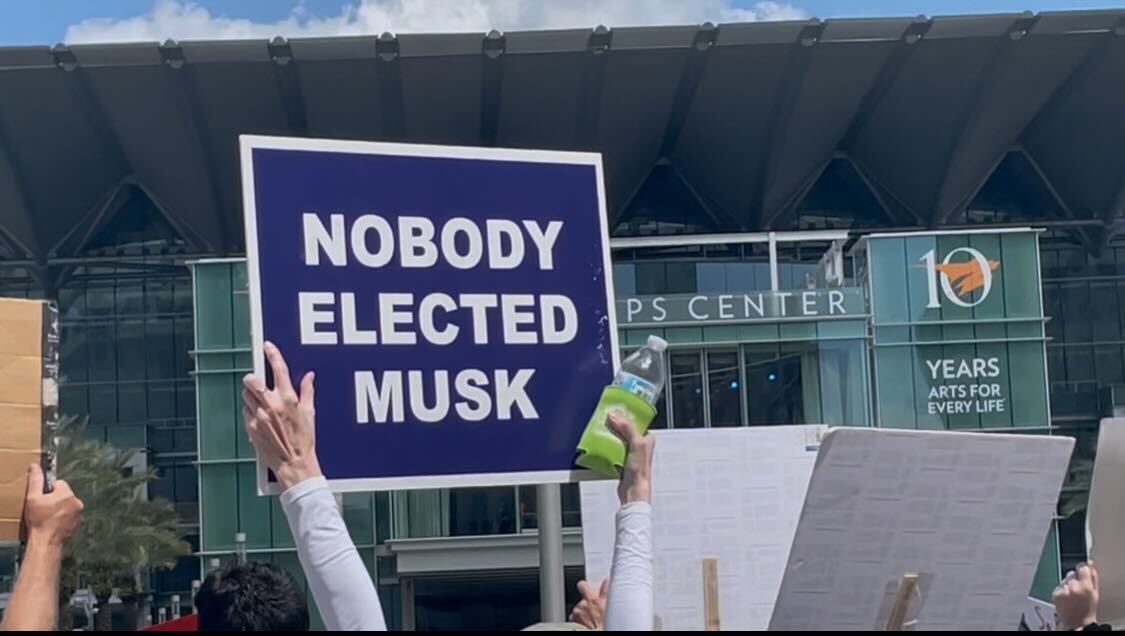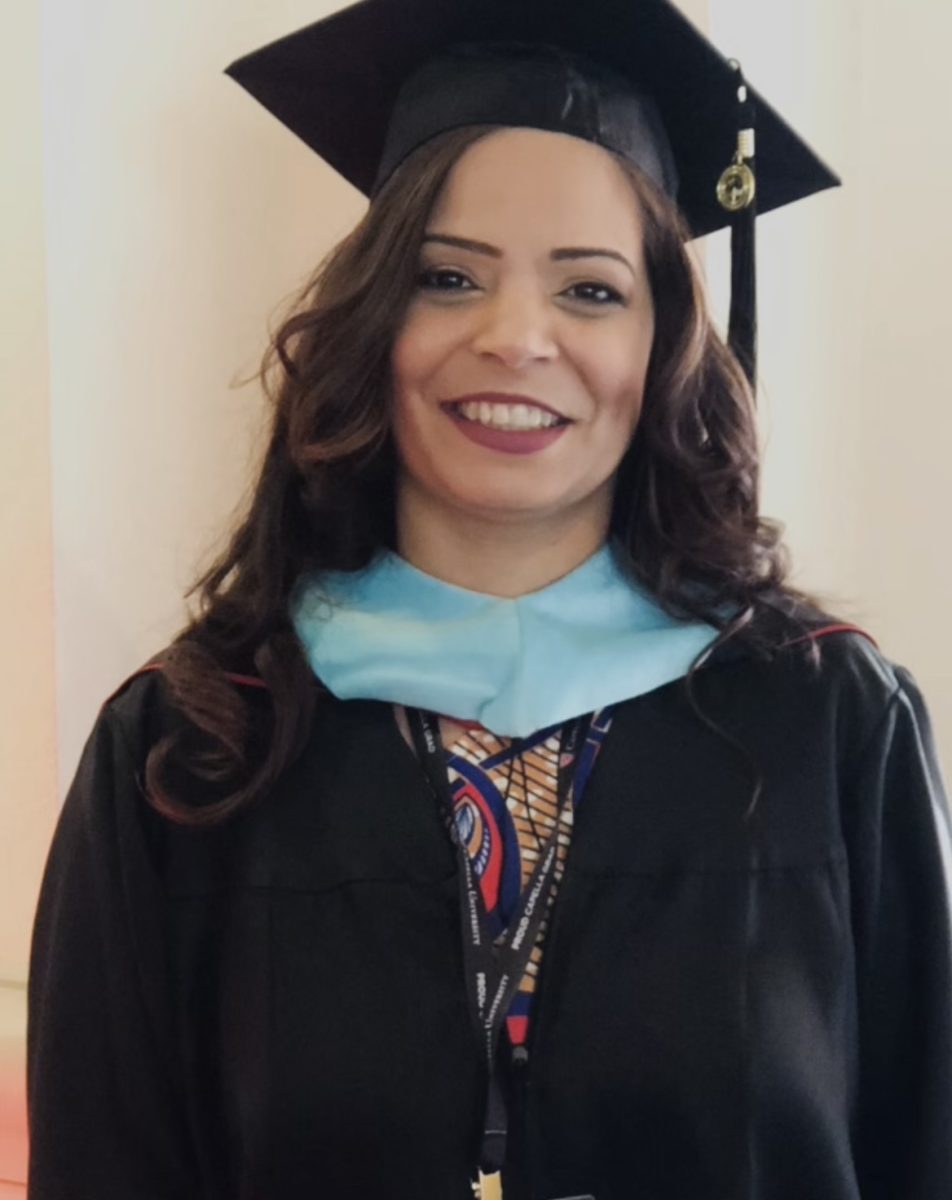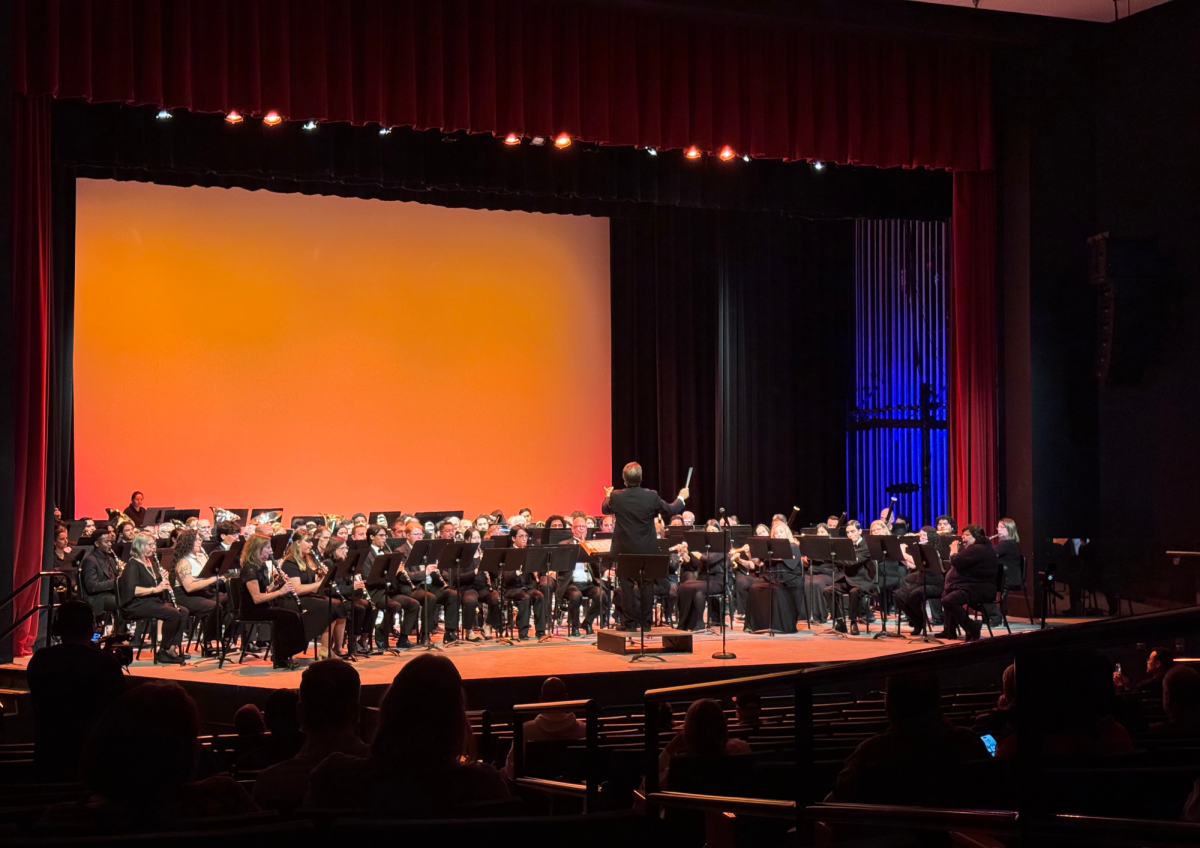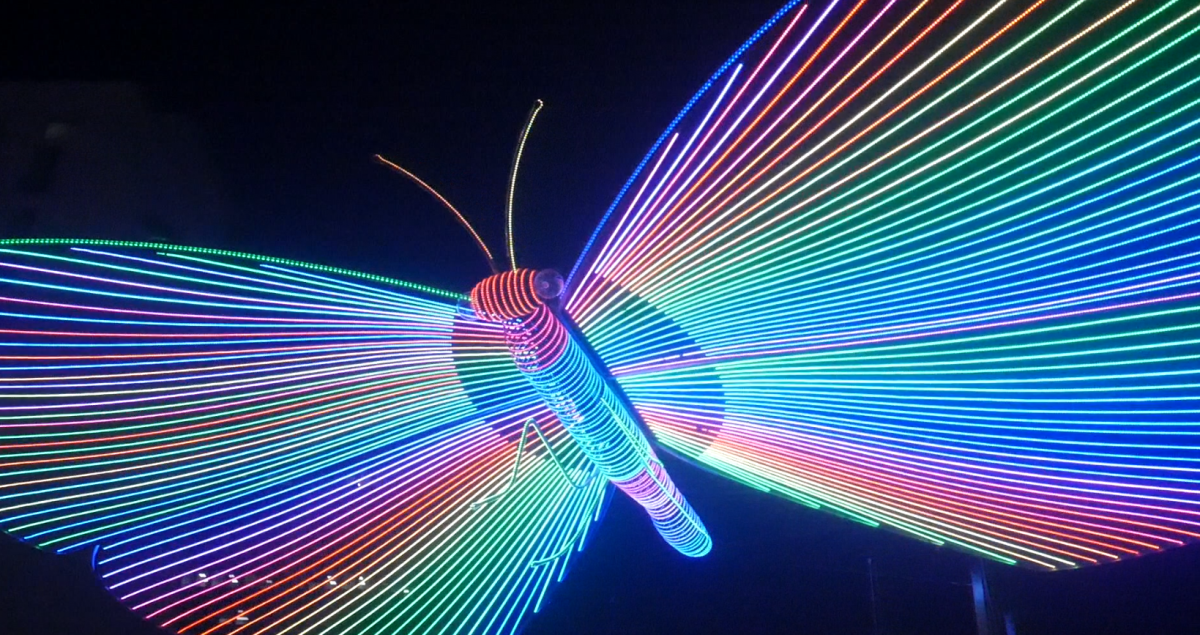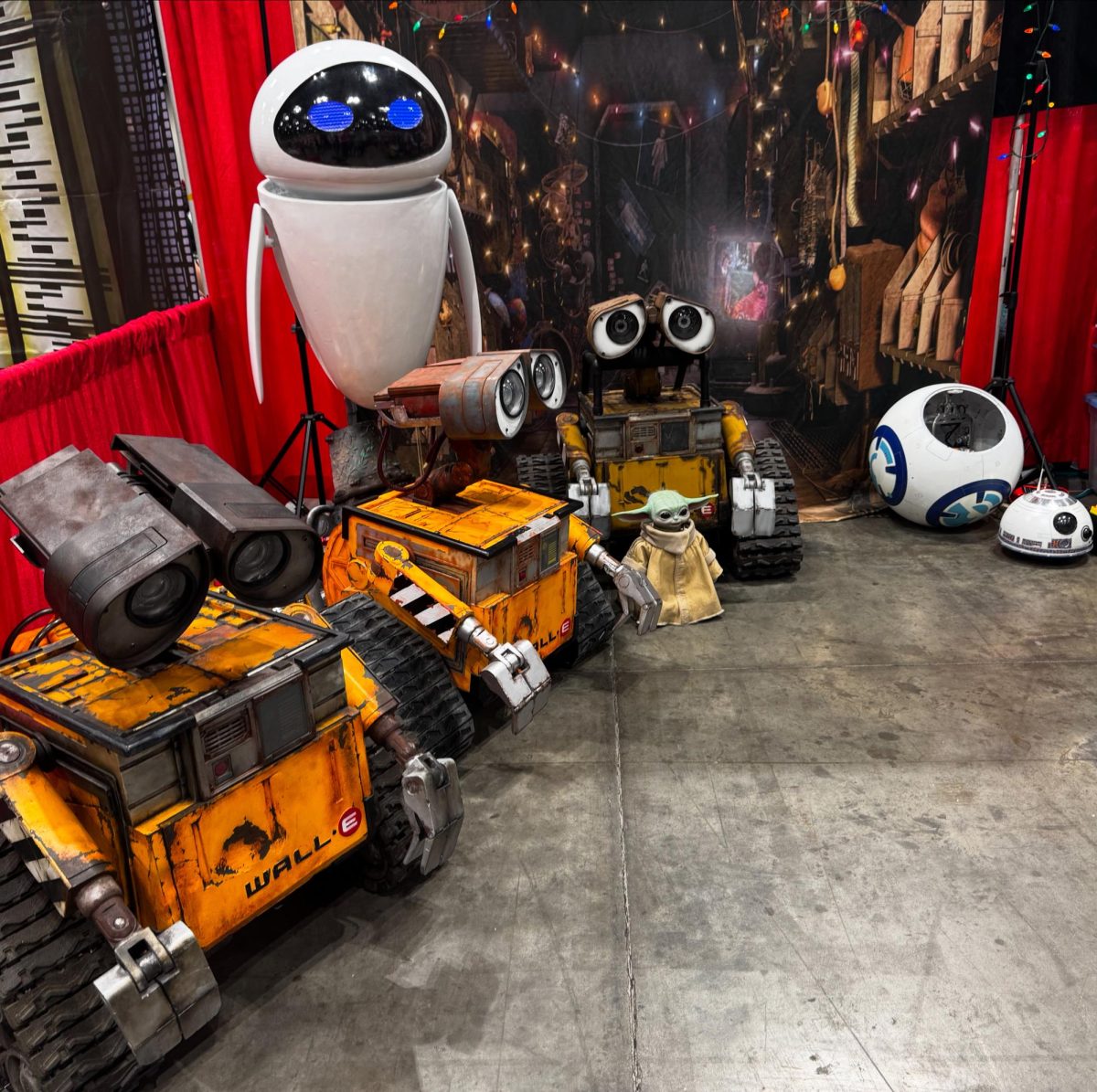One of the newest members of the Florida House of Representatives, Rep. Anna Eskamani has already built a reputation for being a progressive firebrand just a few months into her first term. With fierce advocacy for women’s reproductive rights, gun control, and LGBT equality, Eskamani will certainly have a spotlight on her as Florida politics becomes more and more polarizing.
The 28-year-old daughter of Iranian immigrants worked at Planned Parenthood before being elected represent District 47 this past November. The months before her election were a whirlwind for the Eskamani. She was featured in a Vice docu-series about women running for office, she shared the cover of Time Magazine with dozens of other first-time women candidates, and she received an endorsement from President Barack Obama.
I sat down with Rep. Eskamani this month to discuss her experience running for office, her life before the election, and what she hopes to achieve as a legislator.
Her district office itself is a little north of downtown, converted from a residential house on a quaint little road off Colonial Boulevard. I arrived a little early, as a meeting with her interns was wrapping up. A half-dozen aides laughed and bantered in what used to be a dining room; the way you do when a meeting is over. Eskamani laughed along with them after leaving me for a moment to wrap things up. They were all young, at least college-aged, and dressed casually in school and Hamilton t-shirts and jeans. They looked more like a high school debate team than interns at the office of a state legislator.
Is that the majority of your staff out there?
We have 15 interns, actually. We have a really great family split between Orlando and Tallahassee.
How do you find them?
We share the internship opportunities and a lot of folks just kind of find us. We have high school students, students from UCF and Rollins, I think we have a Valencia student too. So, it’s a pretty cool mix of people.
What do they primarily do?
It depends on if they’re in the district or in Tallahassee — we have folks split. A lot of our district interns are doing research, they’re doing graphic design for social media, they’re engaged in constituent relations.
Our Tallahassee crew is doing a lot of prep for Tallahassee meetings, whether it’s meetings with constituents or press conferences in the Capitol Building with me. Prepping my binders for committee meetings and eventually for the House floor.
So, for example, what was that meeting for?
That was just where they’re all working, that’s their workspace. We give each intern the opportunity to choose a bill to track. We want to make sure they understand the legislative process. They pick a bill that they want to follow and they do an analysis of it and see where it moves in the process. They’re working on that kind of stuff, working on graphic design, on the newsletter.
Anybody from University High School?
I went to University High School. I don’t think any of our interns went to UHS. We have interns from Lyman High School, Seminole High School, Winter Park High School.
What was high school like for you?
I loved high school, and it was a good space to grow. My mom passed away when I was 13 years old, and I was just entering high school, so I found a safe place in the high school theater. That’s a place where I was able to access the arts and spend all my hours there with my friends — who are my good friends to this day. So, that was really foundational for me.
Also, my AP Government teacher, Mr. Norris, got me back into politics.
Back into it?
Yeah, I was a pretty engaged advocate — even when I was a kid. When I was 10 years old was when I collected my first petition.
Oh, wow.
Yeah, I was in my fifth-grade class. One of my best friends was being moved to a different classroom and I refused to let it happen because we wouldn’t have lunch together anymore. So, I collected petitions to keep her in my class, and I presented it to the principal.
Did it work?
No! [laughs] I lost that campaign, but I never stopped organizing for a cause that I cared about.
As I mentioned, my mom passed away, so that was in 2000. And that was also the election of Gore/Lieberman for president. Which, even as a 10-year-old, I was very engaged in. And then my mom passed away four years later, in 2004, so I wasn’t that engaged in that election cycle because I was managing the trauma of losing my Mom.
Entering high school, I just wasn’t connected with politics anymore until 2007, with my AP Government teacher, alongside the election of President Barack Obama — and that got me back into this work.
A lot of people I meet in politics were swept up in 2007 and 2008.
President Obama is very foundational, I think, for a lot of young people. Say what you want about policies, I don’t think anyone denied that his election was high-energy and really hopeful and inspirational.
And that was the first campaign I got involved with. I didn’t really get — I got more involved in 2010. That was the first campaign that I interned on when I was at UCF.
Whose campaign was that?
That was congresswoman Susan Kosmas [laughs]. We used to call her “Susie K.” She was just one term. She was a member of Congress and she represented close-to UCF and Avalon Park.
2010 was a weird midterm.
It was! She served from ’08 to 2010 and lost in 2010. That was a tough year for Democrats in general, as was 2014.
That was the Tea Party year.
That was when the wave started, yeah. I think that’s a really interesting point that you bring up because, when I got to UCF, as an undergrad, I was first really engaged with work around the environmental movement. I was an environmental science major and really engaged in that type of advocacy. And then I started doing work around international human rights, specifically with the Iranian Student Organization – my family is Iranian — [and] I was the Vice President and my twin sister was President.
And then, in the summer of 2010, I met the College Democrats. We were the only two groups tableing that summer. We were collecting human rights petitions for the Iranian Student Organization, they were doing voter registration, and it was a hot summer.
I was actually first registered as a “No Party Affiliation,” and then switched to Democrat that summer and joined the College Democrats and got really involved on local issues.
That’s what jump-started everything?
That was serendipity. Yeah, that was the catalyst. I also worked at Planned Parenthood for six years, and my Planned Parenthood story started out as a patient. I went to Planned Parenthood looking for access to birth control when I was 18 — I didn’t know where else to go. I had abstinence-only education in my school and found Planned Parenthood through a Google search.
I walked into the health center and felt really valued and respected. I started volunteering there when I was at UCF as an escort, walking patients in when we had protestors outside. Interestingly enough, two of those protestors just left the office. They wanted to meet with me and I said “sure.”
Just now?
Just now. It’s funny, as a legislator I try really hard to be open and transparent. When she emailed me I said, “We’re going to disagree, but sure.”
I wish that it had gone better, in the sense that we could agree. But I never raised my voice, I never judge anyone’s perspective. I even get her film the whole thing, because I’m a really transparent person. I’m big on that.
So anyway, I went to Planned Parenthood and got really involved in women’s issues as an undergrad at UCF — whether it was access to abortion, domestic violence prevention, inter-partner violence, equal pay for equal work, all those issues I became really passionate about.
This past election reminded me a lot of 2010.
The energy, right?
A lot of strong reaction to a polarizing president that caused a big result for their opposition party.
I’ve seen that metaphor be made a few times. I will say, Christian, we really organized. We launched our campaign on July 30th, 2017. So, we campaigned for 16 months. We ran for office before you saw a lot of the women decide to run for office. We were one of the first ones to plant our flags in the ground and say, “we’re going to do this.”
Our win [was] absolutely grounded in a lot of hard work. We raised over half a million dollars from 4,000 individual donations. We knocked on 50,000 doors, [had] over 600 volunteers. We earned 80-plus endorsements, including the endorsement of President Barack Obama – among others.
Yes, there was a wave that we say. But in this community, we really build our own wave.
More people are watching and paying attention, and I think that’s remarkable. And it’s necessary because you’re not going to have a truly functioning democracy unless every person is engaged and understanding their power in the process. That’s always my intent — no matter who you are you know you have a voice in this system. Even if you’re not of voting age — some of our interns are high school students. Yet, they still show up and they’re still engaged.
That’s very impressive for a high school student.
It’s super impressive! Because by the time 10 years pass, they’re going to be experts in their craft. And I’m a firm believer that good leaders build new leaders. That’s my commitment to young people, that any opportunity I have to talk to them I will never say no.
Did you come from a politically active family?
No. [laughs] I came from a working-class family. My parents were immigrants from Iran and met in Orlando. My parents were too busy to be involved, and were working full time. My dad went to UCF in ’94; he became an electrical engineer. He worked on the Florida Space Coast on the weekdays and he worked at Walt Disney World as a customer service representative on the weekends, just to make ends meet. And my mom had an accounting degree from Iran, that she couldn’t use here. She worked at fast food restaurants and eventually K-Mart, and that was her last job before she passed away. I do remember watching the debates as a kid. I remember going with my mom to vote. But beyond that, my parents weren’t engaged.
Were they surprised at your political activism?
[Laughs] That’s a good question. I think as an immigrant you have to be tough. My first experience with racism, as an example, was when 9/11 happened. I started to be treated differently. A lot of people had just assumed that I was Latina, as a person of color in Florida, and once [9/11] happened there was a distinction. And, of course, Latinas are already discriminated against, right? But now it felt like I was in a new box – that’s villainized to a more extreme degree. And that was tough. You just have this feeling of, “I’m different,” and that’s not okay. I wouldn’t say that I was necessary; I think there was an understanding that there was an injustice happening. At a young age, I had that understanding.
My mom would talk a lot about how she wanted to go back to Iran to see her sisters, but the government made it more difficult. And then I have this perspective [that] government can be good or can be bad. It’s a system that can really divide you or bring you together. And when she passed away she never saw her sisters, after two decades.
When I got to UCF, my dad encouraged me to study biology, physics, and chemistry. He never told me not to do politics, but his recommendation was the hard sciences. When I first got to UCF, I was an environmental science major, but then I switched to my Political Science minor to my major and then I also brought on women’s studies as a second major. And when I told my dad that, [laughs] he was fine with it. I think he was a little surprised, but a lot of our activism — I say “our” because my twin sister and I are very much cut from the same cloth — a lot of my stories are her stories too. And we just found a home in this work. We found a home in building something from nothing, and for connecting people to their fullest potential.
I think most immigrant parents want their child to study something that’s safe. Something safe and secure and that’s the medicine, attorney, kind of comes to mind. I think if you’re able to find your passion in your work that’s an incredible gift.
When did you stop working at Planned Parenthood?
I left Planned Parenthood in June of 2018.
That’s when you were running?
I was still working on the campaign. I was still working at Planned Parenthood when I announced [that] my role had changed because I was a Senior Director of Public Affairs and Communications but when I declared, I was moved to another department — away from the political work, in an effort to have a distinction. I believe the new title was “Director of Cultural Diversity and Inclusivity,” under the HR department.
I left in June of 2018 and I now work for NEO Philanthropy, which is a fiduciary arm for foundations that provide grants to nonprofits that do work on social justice issues — and I’m the state adviser for Florida. So, I still work full-time.
I work remotely now, which is nice. I can work anywhere.
Do you remember the moment you first thought, “I can run. I can do this.”
It wasn’t easy. I remember the process.
The first step after you decide to run, what’s that like?
When I was thinking about really running, I actually wrote down what I would say if I lost. It was really hard for me to accept the idea of losing. I really struggled with it.
What was concession speech?
I mean, I wrote it. It’s on my Google Drive. I really wanted to understand the victory and loss. I wanted to be able to accept the fact that I might lose and if I lose, the speech [had been] written. It’s there. I’m good. I don’t have to think about it.
At the same time, crafting that helped me understand the victory even in a loss. And it came in two forms for me: one was telling stories that nobody else was going to tell. Whether it Never Again, Me Too, Black Lives Matter, issues that impact the environment, holding corporations accountable. Whatever the issues were, they were topics that needed to be discussed. By running for office, I would have the opportunity to share those in a really profound and important way [and] that could maybe change the narrative, change the culture, and impart some sense of transformation for those that we get a chance to meet and talk to.
The other win, even in loss, was building new leaders. Our campaign had 600 volunteers; we were diverse in every way. Our volunteers were of every cultural background, economic background, demographics of age but the focus of the grunt work every day were young people. And I knew that if we ran this campaign that we would be able to build the next candidates, have strong communicators, teach empathy, teach fundraising skills; whether it tangible skills or things that are more on a value system, we would have an impact.
So, I wrote that and I was like, “Okay!”
Did you have any network or apparatus before you ran? Or did you just dive in?
I just went all in. We built it from scratch.
Did you first have to contact the Democratic Party? How does that work?
Kinda-sorta? The Democratic Party did not recruit me. They were not essential to my campaign, in a way.
I’m a member of the local Democratic Party; I have been since 2010. The party structure is that almost every county has a DEC — a Democratic Executive Committee. That’s your local party infrastructure. And then we all fall under the Florida Democratic Party, which falls under the [Democratic National Committee.]
So, I was a DEC member since 2010 and was a board member for a few years too, so I had the relationships. But when you make the decision to run for office, you just have to run and you have to run hard. Because, at the end of the day, anything can happen.
I knew that if I wanted to run a good race, we’d have to launch early and give ourselves time to build and raise money. And we’d have to raise a lot of money.
So it began in 2018?
Well, I actually ran in July of 2017. So, we ran super early, and it was earlier than I thought. The initial plan was on August 1st, 2017, but the Republican incumbent for this seat [Rep. Mike Miller] decided to run for Congress.
I was originally going to run against him. We were ready; we were building up our case, we were painting the contrasts to go up against Mike Miller. So, when he ran for Congress, we pulled everything up, and we went live on July 3rd of 2017 having approved our logo at 2 a.m. that morning.
And then, six hours later I’m at a coffee shop, the Drunken Monkey, in the district, with a reporter. And I told the reporter what our plans were and I asked if he would embargo the story because it was the holiday weekend, and I just felt like it wasn’t the best time to announce the campaign. And he said “No,” [laughs] and I was like, “Okay, no problem!”
So, I left the coffee shop and I was like, “Oh god, we have to get to Tallahassee.” Because, in Florida, until you file you can’t do anything. You can’t raise money, you can’t open a Facebook page – you have to file. And most people mail in their paperwork, but there was no time. So, we got in a car, a friend drove me to Tallahassee, and we did a press release as we drove. I called my boss, “Hey, I’m going to run for office. I’m doing it right now.” It was so wild. Sometimes you just can’t stop the train.
The article went up at three o’clock. We were officially filed at 3:41. By 4:30 we’re raising money online and we raised over $12,000 on the first day.
How did you get the word out?
It was very organic. We took down the internet that day. That Florida Politics article was everywhere. Our Facebook page was ready to go live. We didn’t have a full website yet. We just had a donate and sign-up page.
How many people were with you at that point?
[Alex Weeden] was my campaign manager, and we had maybe three interns at the time. It was all very early. It was a small team, I’d say maybe at the most 10 people were engaged at a deeper level. But it was all very much starting from scratch. Even my campaign manager, Alex, was a first-time manager. So it was a lot of training with him, a lot of mentoring, because Alex comes from some experience but no management experience. And that takes time to learn.
And again, I’m really proud of that. Our team was a collection of young people who never really had these types of roles before. But we created space for innovation, we created space for learning experiences, and it’s such an incredible gift because we like to see people grow.
Was there a nomination process you had to go through? Was there a primary?
Well, we had a fake primary actually. The Republican Party of Florida tried to recruit a Democrat to try and challenge me. Because we raised a lot of money early on, because we knocked on a lot of doors early on, the district supported me. There was no question that I’d be their candidate. We did everything we could to build that trust.
How does someone hire a fake Democrat?
It’s pretty easy, they can just file to run. I mentioned that our process of filing was going to Tallahassee, but we also collected petitions. But instead of collecting petitions, you can just write a check.
So, what happened was just before the filing, some random person runs. He doesn’t even live here, he lives in Apopka.
You don’t have to live in the District to be elected there?
I think you have to live there the night of the election.
Who was this guy?
I don’t know his name. I’m so embarrassed. What was his name? It was…oh my goodness. Forgas! Lou Forgas.
He randomly filed, and I noticed that his treasurer was a Republican consultant, which was a red flag.
So, how does it work from there?
Well, every situation is different. But in our case, I looked at his qualifying paperwork, and I noticed that his wife was his notary — which is against federal law. So, I ended up filing a lawsuit.
It sounds like you won.
He removed himself from the case before a case we even decided, because we were going to win the lawsuit. I was suing on the fact that he didn’t qualify because his paperwork was invalid because his wife was his notary.
So, there wasn’t official confirmation that the GOP was involved?
There was enough evidence, and I don’t know if I would even say “GOP,” I think it was one of our opponents. There were two Republicans running against us.
The father of one of them had actually threatened to me that there would be a primary, so there were enough dots for me to connect.
Is that common practice?
Good question. I don’t have statistics to refer to, but I think it shows how polarizing local elections can be. And I think you have to maintain as much order and empathy as you can. It was hard for me to file a lawsuit, but at the end of the day, I knew in my heart it was the right thing to do because this was a candidate recruited to confuse voters – and that’s not okay.
I felt like it was very deceitful. He didn’t even live in the community. It’s funny because everything happened too late, in the sense that he was still on the ballot. We still had a primary – even though he was disqualified he was still on the ballot and it was still printed with his name on it. Although, we still won overwhelmingly [laughs] even though there was still a vote. It was so funny.
But I’m telling you, every obstacle the Republican Party of Florida or our opposition could throw at us, they did. So, that was one example of many. But we faced so many attacks on the campaign trail.
Did the 2016 election do anything to spark you?
Yeah, the election of President Donald Trump put me in a place like, “We have to do something.” If we’re going to have a truly representative democracy, we have to have more people who look like us and come from our stories and can relate to us.
But, I didn’t think it should be me. I encouraged a lot of my girlfriends to run for office instead. And then one of once asked, “Why aren’t you running for office?”
And I realized that if I couldn’t take that leap of faith if I didn’t have the courage, how could anybody else? I felt really strongly that if we could demonstrate the possibility of someone like me winning, a woman of color from a working class, immigrant family, with a funny last name – if I could be the one to do this and do it well, it would inspire people like me to do the same.
Who did you support in the 2016 primary?
[Laughs] I regretfully supported Hillary Clinton. And I say that because I worked at Planned Parenthood at the time, and Planned Parenthood endorsed her so I didn’t really have a choice. I worked with the Planned Parenthood PAC.
So, I take it that who would have been your choice in retrospect it currently running?
Bernie would be my choice, absolutely.
Do you consider yourself apart of the younger crop of Democrats swept up in 2016 and started taking those ideas into the mainstream?
I’ve always been a progressive. But I don’t think I ever — I think in the case of Hillary Clinton I was too excited for the potential for a woman president. I wanted her to break the glass ceiling, I found that inspirational. That was so important to me, you know?
But now I’m back to who I am as a person — I do have a different measurement. I honor women who run for office and want more women in elected office, but I care a lot more than their views on issues like criminal justice and economic justice line up with mine. Do I do think about that very critically?
I do define myself as a Progressive Democrat, but I think we each define that so differently. For me, it means practicing empathy, it means leading with inclusivity, and I do want to have everybody at the table.
I just had two anti-abortion folks in my office who were filming me the entire time (laughs). Who knows where that video will be? But I honor transparency, and I try to invite everyone to the table whether it’s business, faith, nonprofit, or government. I try to take that approach as often as I can.
When someone thinks of you in your district, what issues do you want to be associated with?
The topics often include education, environment, affordable housing, alongside the cost of health care, and arts funding. Those are the five big ones that come up a lot. Gun violence is the 6th one. This is the home to Pulse Nightclub, so I wear my ribbons every day. I wear my rainbow ribbon and my transgender ribbon as a reminder of purpose and solidarity. So we’re unapologetic when it comes to issues regarding gun safety as well.
You just filed a bill, didn’t you?
I did.
Was it your first one?
No, that was our fourth bill. It was one we worked on for weeks now so I was happy to file it. It’s aimed at keeping guns out of the hands of domestic abusers.
What is the process of drafting a bill?
So, the Florida legislature is home to some incredible staff. There’s actually an entire drafting department. We’ve drafted a lot of legislation for constituents who have ideas. We only have six bill slots. We have unlimited appealer bills and unlimited appropriations requests, but only six bill slots. We’re very limited in what we can actually file.
Is that for everyone?
Every house member; Senate has unlimited. So, if you have an idea you can just let bill drafting know. There’s a dashboard we use, so you can put in “Hey bill drafting, I have an idea for a bill. I want x-y-z to happen.”
It helps to have specific examples, or actually point out in a law where changes should be made. And bill drafters work on it with you and they craft it, and at the end of the day, you have to approve the language. I’m currently working with bill drafting on the Senate side because we have a Senate sponsor for our bill. I heard — we had our idea about domestic violence convictions, and removing guns from those with convictions — we heard out the idea, and I heard that Senator [Lori] Berman had a similar idea, so I called her office to bring our two ideas together.
So it’s not like you and your staff had to hunker down and craft the language of the bill?
No, you have a team. If you’re skilled to do that yourself, that’s fantastic, but you have a drafting department that helps you. And the drafting department also does amendments for you. So if you’re preparing amendments for other bills, it’s the drafting department that does it for you.
How do the prospects of the bill look so far?
It’s really tough to pass proactive, gun-safe legislation in this chamber. We will push, but I think that the chance of it actually passing right now is actually really low. But it’s too important of a subject to ignore. Even while we were drafting the bill, there were instances of gun violence that [have] a domestic violence connection. So, you can imagine how I feel, trying to work on this bill alongside Senator Berman, the acts of violence keep happening. Which makes it even more important for us to file.
Even if it doesn’t move this session, it’s so important for our constituents to know and for the state of Florida to know that you have legislators that understand the connection and are trying to do something about it.
The 2020 primaries are coming up, which is wild, how involved are you going to be in that process?
Not really that involved, actually. I’m very focused on the legislative session. That formally starts from March to May, so that’s where my intention is right now. I’m obviously watching the candidates as they file and make their campaigns official. But unfortunately, I only have so many hours in a day, and those houses are very focused on legislature getting started.
I’m also getting my doctorate at UCF right now, so I have homework. And I work full-time.
What are you getting your doctorate in?
Public Affairs.
How many hours a week do you spend in this office? Or spend being a representative?
These are 13 hour days, it’s crazy.
On top of working full-time?
I mean, I work a second shift — right? I take calls throughout the day, and I bring my work home. My job offers a lot of flexibility where I don’t have to work 9-to-5 because I work remote. But I’m working 24/7.
How has your life changed since being elected?
I’ve always been a busy person, but I’ve never been this busy before. You’re just learning so much and meeting with so many people. The Tallahassee culture is 15-minute meetings, so if you can imagine 10 of those back to back.
And from my perspective, I want to make sure that every person knows that I’m engaged, that I’m listening, that I’m learning. So, I give a lot of my energy and my heart to it as well.
And by the time that’s over, I’m like “Okay, now I have to go to committee meeting!” And prepare for that. I’m still learning to master [time management] in this work. I’ve always been someone to give everything that I have, and I feel like I was born for this.
What do you do for fun?
[Laughs] “What does Anna do for fun?”
I like to read poetry, I read a lot of poetry by women-of-color poets — I find it really inspirational. I love to go to the beach, I try to go at least once a month.
What’s your favorite beach in Florida?
My favorite beach is Sebastian Inlet State Park. My go-to to is Cocoa Beach because it’s closest. I usually just go east of Brevard, that’s what I do. I try to see the sunrise once a month if I can.
It doesn’t sound like you have a lot of free time.
No, I don’t. I have married the state of Florida, that’s for sure.
What were your expectations going into all of this, versus the reality?
It’s funny, I had been involved with the legislature for a few years, with Planned Parenthood, bringing patients to Tallahassee to advocate. So, I understood the process. I understood the building, which might sound funny by the building can be overwhelming for people — where to go, how to find your way, where the buildings connect.
Fortunately, I have experience. I know a lot of the legislators. I was never naive coming in, I had an understanding of these systems and that helped. I don’t think I understood a lot of the rules. There are so many — whether they are enumerated or just unsaid – there are a lot of rules that you have to learn.
So, for example, sponsoring an amendment, withdrawing an amendment — those procedures. There is also the unspoken protocol that I’m learning.
To give some examples, in the committee meeting space — protocol around how many questions you can ask, around letting the chair know that you have questions, or ask the chair a question before the meeting starts. There are really interesting, nuances that you have to learn on your own. And that’s been really interesting.
I think something else too that I’m really grateful for is the bipartisanship. And I’ve always had Republican friends; we even had “Republicans for Anna” stickers on the campaign. I honor and love our Republican supporters.
Did you expect the bipartisanship?
I guess that I didn’t really know what to expect. I came in with clear eyes and a full heart.
When you see the polarization, especially federally. I appreciate that I can build relationships at the state-level. We’re going to have food fights, absolutely. But I try hard to disconnect the issue from the person.
How involved are you in city politics? Are do you only operate at a state level?
I think that I’m fairly engaged at a local level. I never endorsed anyone as a candidate, because I felt like it was a little premature. I also want people to be able to decide who their leaders are, but I know that my supporters look to me for guidance. I try to be a voice of reason, but I’m sensitive to how much; I want to be respectful to the local dynamics.
Part of the work of our office that we want to be a facilitator. We might have a constituent call us with an issue about, let’s say a traffic light in the city of Winter Park. It might be a city road, not a state road. In that case, I’d have to facilitate — our office would call the City Public Works Director and connect the dots there.
Is there anything you’re up to right now that your constituents should know about?
Oh my gosh [laughs], what don’t they know? The legislative session is going to start, and that goes from March to May. I’ll be in Tallahassee a lot. Which kind of hurts my heart because I like to be in the district when I can. I’ll try to come back every weekend, but some weekends that just won’t be possible.
What’s going on in the House?
There are major issues being debated. Health care is going to be a huge issue. I’ve also been fighting really hard for UCF right now. That’s been one of my biggest focuses this past week. Some other issues are criminal justice reform, environmental protection, protecting schools. Everything under the sun will be debated.
I also sit on Ways and Means, so I’m fighting to close corporate tax loopholes or at least call them out when I can.
—
Since this interview took place, Eskamani has attended her first sessions at the Florida House of Representatives.

